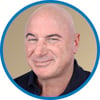Why I fell in love with dermoscopy & never looked back
Special feature: Get to know dermatologist & dermoscopy educator A/Prof Cristian Naverrete-Dechent as he shares what sparks his passion for work & life.
.jpg)
HealthCert Education
In this special feature, passionate dermatologist and dermoscopy educator Associate Professor Cristian Naverrete-Dechent shares how a simple tool sparked a lifelong interest in skin cancer diagnosis.
 From the excitement of new technologies like UV dermoscopy to reflections on teaching, research, and learning from every patient, Cristian's insights offer a compelling look into the evolving world of dermoscopy and the joy of sharing that journey with others.
From the excitement of new technologies like UV dermoscopy to reflections on teaching, research, and learning from every patient, Cristian's insights offer a compelling look into the evolving world of dermoscopy and the joy of sharing that journey with others.
What first sparked your interest in dermoscopy and melanoma detection?
When I was a resident, I remember being drawn to dermatoscopes: this simple pocket tool that everyone was using, even though I didn’t know much about it. Back then, we were mostly doing “blink” analysis — it was all quite chaotic and not very technical. But years later, that approach has actually proven to be very useful!
Diagnosing and treating skin cancer is what motivated me to become a dermatologist. So what could be better than this, right? Combining a simple, inexpensive, and highly effective diagnostic tool with early detection? I’m sure you can see why I was captivated right away.
What’s a new concept or approach in dermoscopy that excites you right now?
Everything related to the new light modes, especially ultraviolet (UV) dermoscopy. After so many years, we’re finally incorporating a new light mode that’s beginning to find its place alongside polarised and non-polarised light. We're discovering so many new uses, including some unexpected ones beyond oncology, like infections and infestations. Every time I use my dermatoscope now, I also toggle to the UV mode, and sometimes we find things that are both fascinating and clinically useful.
You’ve seen thousands of lesions — do you still get surprised sometimes?
Every single day! I think we all go in with an idea of what we’ll see under the dermatoscope.
But sometimes you look at a lesion with the naked eye and expect one thing, and dermoscopy reveals something completely different.
That moment is so exciting. Like saying, “Wow, dermoscopy helped me make a diagnosis that would have been impossible otherwise.”
Is there a moment or case that changed the way you practise or teach?
Whenever I come across a treatment failure (and dermoscopy often reveals it) I sit down and ask myself: What could I have done differently? Was there something I missed? How can I do better next time? And sometimes, I ask:
How can dermoscopy help me in situations like this?
What’s one thing you wish more GPs understood about lesion assessment?
That dermoscopy, combined with a good clinical examination, is better than clinical examination alone — and that there are limits to what each component can reveal. Every piece of information matters: the clinical history, physical exam, and dermoscopy all contribute to a more accurate diagnosis. We shouldn’t rely on just one.
Image: Instagram @cnavarreted
What’s your favourite part of teaching other doctors in dermoscopy?
My favourite aspect is the people you meet along the way.
Academic work can be quite dry at times, but the opportunity to share knowledge and have meaningful discussions with colleagues and friends from around the world makes it truly rewarding.
What advice would you give to your younger self starting out in skin cancer medicine?
Enjoy the journey more! Don’t just wait for the “arrival point” — enjoy every step, because it's full of amazing moments.
Learn from everyone around you, and make the most of every patient encounter. Everyone has something to teach you.
And finally, don’t do anything you don’t want to do.
If doctors could walk away with just one changed habit after your Masterclass, what should it be?
My baseline goal is to encourage attendees to use their dermatoscope on every single lesion. And I’m pretty sure they’ll do it. But what would really make me happy is if they internalise dermoscopy — if they continue learning beyond the course, and maybe even begin their own research.
What do you do when you’re not diagnosing melanomas or teaching?
 I’m a father of three little girls, so most of my time is spent with them at home or out and about. I also love playing the electric guitar. Fun fact: I had a band and we even released an album on Spotify! And I love running. (I’m not ready for a marathon yet, but I can definitely do 21K!)
I’m a father of three little girls, so most of my time is spent with them at home or out and about. I also love playing the electric guitar. Fun fact: I had a band and we even released an album on Spotify! And I love running. (I’m not ready for a marathon yet, but I can definitely do 21K!)
Image: Instagram @cnavarreted
Meet A/Prof Cristian Naverrete-Dechent in-person in Brisbane at the upcoming Dermoscopy Masterclass.
📍 15-16 August 2025 | The Westin Brisbane

 1800 867 1390
1800 867 1390
.jpg)
-1.jpg)
.jpg)



